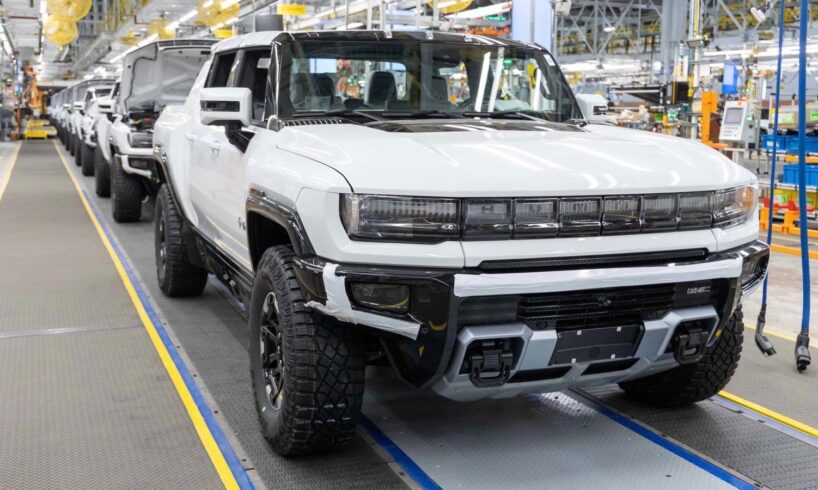
Electric Hummers on the assembly line at GM’s Factory Zero [Photo by Jeffrey Sauger/GM]
General Motors on Wednesday announced a new wave of job cuts at its US electric-vehicle and battery operations, part of a mounting assault on jobs throughout the American and global economy. This follows Tuesday’s announcements of more than 50,000 layoffs at Amazon, UPS and Paramount Global and increasing signs of an economic downturn even as the stock market continues to rise to record highs.
GM will reduce Detroit’s Factory Zero to a single shift in January 2026, eliminating about 1,200 jobs. It is pausing battery-cell output for six months at its Ultium plants in Warren, Ohio, and Spring Hill, Tennessee, affecting another 2,100 workers through temporary and indefinite layoffs. The company cited “slower near-term EV adoption” and the elimination of federal EV tax credits and easing of emissions rules, while taking a $1.6 billion charge tied to its revised EV strategy.
The cuts are already rippling through the supply chain. Dana Thermal Products (a subsidiary of Dana, Inc.) is permanently closing its Auburn Hills, Michigan, plant—opened to build EV battery cooling plates—destroying roughly 200 jobs amid “lower-than-expected EV volumes” from automaker customers. The closure, detailed in a WARN filings last week, is part of a broader wave of supplier contractions across Michigan and other states.
At Ford’s Rouge Electric Vehicle Center (REV-C) in Dearborn, UAW Local 600 officials told members on October 23 that all of the local’s workers at the site would be laid off indefinitely, a notice the local quickly rescinded even as Ford is evidently preparing further cuts. In March, Ford already eliminated 1,400 jobs—roughly two-thirds of the workforce—at REV-C, dropping operations to a single shift. Workers who were told they were the spearhead of a “new American manufacturing” now face layoffs, speed-ups and transfers.
GM’s reduction of Factory Zero, located in the Detroit enclave of Hamtramck, underscores a strategic pullback from the accelerated EV timelines shouted from corporate podiums just a year ago. The plant builds GM’s Chevrolet Silverado EV and GMC Sierra EV pickups, alongside the Hummer and Escalade IQ. GM says output will fall by about 50 percent with the shift change.
A similar process is underway at GM’s Lake Orion Assembly north of Detroit. Originally slated for a $4 billion conversion to build the Silverado EV and Sierra EV pickups, GM has canceled the project after repeated delays and will now retool the facility for gas-powered Cadillac Escalade, Chevrolet Silverado LD and GMC Sierra LD production by 2027. Industry reports describe EV-assembly tooling being removed or repurposed for the new gas-powered models.
A young electrical worker who took part in the construction of the EV production lines at Lake Orion told the World Socialist Web Site, “I was part of the crew that built those lines, and then they had us tear them down. The waste of money and manpower is insane.”
Earlier this month, GM ended production of the BrightDrop electric delivery van at its CAMI plant in Ingersoll, Ontario, citing a slower-than-expected commercial EV market. The move could mean the closure of the factory, which has been idled since May 2025, and the loss of 1,200 workers’ jobs.
GM has also laid off 200 salaried workers at GM Tech Center in Warren, Michigan, and closed an information technology center in Georgia, eliminating about 300 jobs.
Other EV makers are also rolling back production. Rivian, which makes EV pickups, SUVs and delivery vans, said last week that it was laying off 600 workers. Volkswagen also plans to temporarily halt production of the ID.4 electric SUV this month at its factory in Chattanooga, Tennessee.
The layoffs are not limited to the major automakers and their first-tier suppliers. In addition to the closing of the Dana Thermal Products plant, the Detroit Free Press reported International Automotive Components (IAC) Group is shutting two auto plastics plants in Mendon and Alma, Michigan, eliminating another 250 jobs. The UAW has issued no statement on the plant closures.
Industry analysts have repeatedly warned that Trump’s 25 percent auto and parts tariffs will mean layoffs and bankruptcies for many suppliers and higher new-car prices, with impacts cascading through lower-margin tiers. The Free Press is now reporting that “Detroit automakers face a possible semiconductor chip crisis due to a dispute between the Dutch government and a Chinese-owned chipmaker,” which “could put the brakes on much of their new car production.”
This follows a September fire at the Novelis aluminum sheet plant in Oswego, New York, a facility supplying roughly 40 percent of US auto-grade aluminum. This has become a major choke point, forcing temporary shutdown and production cutbacks at multiple automakers, which are unable to import aluminum due to massive tariffs.
As a result, Ford cut profit guidance, estimating a $1.5–$2.0 billion hit this year as F-150 production is curtailed; Stellantis idled its Warren Truck plant for weeks; analysts warn the supply disruption will linger into 2026.
According to Cox Automotive, third quarter US EV sales hit a record 438,000 and approximately 1.05 million year-to-date, driven by a rush to beat the deadline for the expiration of the $7,500 EV consumer tax credit. “October sales fell sharply after the credits expired, confirming industry warnings of a policy-induced slump,” the publication stated.
In addition to the EV tax credits, the Biden administration provided billions in Department of Energy and other federal loans, grants and tax credits to the automakers and their joint venture partners to build electric battery plants, retool assembly lines for EV production, and secure and refine critical minerals needed for EV batteries. Biden also set a non-binding target for 50 percent of new US light-duty sales to be “zero-emission” by 2030, i.e., battery-electric, plug-in hybrid, or fuel-cell.
President Biden at the GM Factory Zero in Detroit-Hamtramck in 2021 [Photo by General Motors / CC BY-NC 3.0]
Biden’s EV subsidies and domestic-content rules were aimed not primarily at the environment, but at catching up with China’s overwhelming EV and battery lead and locking down strategic supply chains. This is needed not only for auto industry but the US military. Although it was widely acknowledged that the shift to EV production would lead to massive job losses, the United Auto Workers bureaucracy cheered this on as crucial for “national security,” saying its collaboration with the Biden administration to unionize battery plants and police low wages and sweatshop conditions was a “just transition to EVs.”
In his first day in office, Trump issued an Executive Order, titled, “Unleashing American Energy,” that not only encouraged the exploration and production of fossil fuels on federal lands and water, but eliminate the “electric vehicle mandate,” terminate “state emissions waivers that function to limit sales of gasoline-power automobiles” and “unfair subsidies and other ill-conceived government-imposed market distortions that favor EVs over other technologies…”
As part of the One Big Beautiful Bill this summer, Trump ended $7,500 tax credits for new electric vehicle purchases on September 30, along with $4,000 for used models, seven years earlier than planned by the Biden administration.
In a backhanded acknowledgement of the domination of EV production by Chinese manufacturers like BYD, Trump has claimed a rapid EV shift would “hand the US auto industry to the Chinese.”
Auto executives and politicians around the world wave the “China threat” to demand layoffs and restructuring. Former Stellantis CEO Carlos Tavares has warned that Chinese EV makers could overrun Europe within years and said only a handful of automakers would survive the “Darwinian struggle” to cut jobs and labor costs.
Whatever their differences on the pace of electrification, the class content of the policies of both capitalist parties in the US is the same: a nationally-based, protectionist program that keeps profits whole while offloading the crisis onto workers, and the expansion of the US military industrial complex to secure global supply chains and wage war against China.
The United Auto Workers is fully onboard and has offered its services to ramp up wartime production and enforce labor discipline. UAW President Shawn Fain—who lauded Biden’s EV policy as a worker-led transition—now fully backs Trump’s tariffs and hails the destruction of autoworker jobs in Canada and Mexico as a victory for American workers. The UAW apparatus was silent on GM’s layoffs Wednesday and instead boosted Trump’s trade war measures on its X platform, blaming plant closures and layoffs on the “free trade disaster.”
In an interview published in Democratic Socialists of America-aligned Jacobin magazine last week, Fain praised Trump’s tariffs again, and outlined the Neanderthal outlook of the union bureaucracy. He called the breaking up of the globally integrated auto industry and stuffing it back within the confines of nationally-protected countries so Canadian, Mexican and American workers could each “build what they buy.”
In the one true statement he made, Fain said, “The UAW’s mission hasn’t changed—no matter who’s in the White House….” Indeed, the UAW apparatus role has not changed: to enforce corporate decisions, divide the workforce, and block any independent fight by rank-and-file workers to defend their jobs, living standards and basic democratic and social rights. Fain & Co. are now doing this on behalf of a fascist president moving to establish a dictatorship and launch World War III.
Autoworkers need their own strategy and their own organizations. That means building independent rank-and-file committees in every plant and warehouse, linking across companies and borders through the International Workers Alliance of Rank-and-File Committees (IWA-RFC).
Workers must fight for:
No layoffs or plant closures! Full income and benefits for all workers affected by production cuts and supplier shutdowns.International unity, not trade war! Unite workers in the US, China, Mexico, Canada, and Europe against the corporate-state offensive; oppose the drive to war.The socialist reorganization of the auto industry! Public ownership and democratic workers’ control to deploy technology for human need and environmental repair—not private profit.
Join the fight to build rank-and-file committees by filling out the form below.
I want to discuss joining or building an autoworkers rank-and-file committee:





